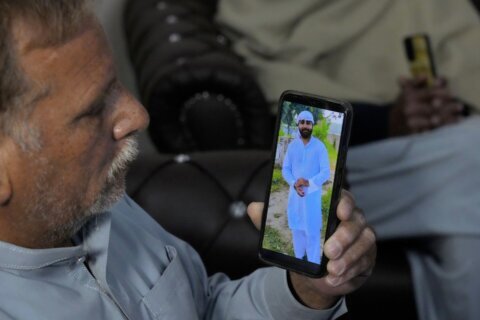TBILISI, Georgia (AP) — Tens of thousands of Georgians massed outside parliament Monday night, demanding the annulment of the weekend parliamentary election that the president has alleged was rigged with the help of Russia.
The rally underlined tensions in the country which lies between Russia and Turkey and where the governing Georgian Dream party has become increasingly authoritarian and tilted toward Moscow. However, it ended peacefully after several hours and there were no clear plans for further actions.
“You did not lose the election,” President Salome Zourabichvili told the demonstrators who waved Georgian and European Union flags. “They stole your vote and tried to steal your future, but no one has the right to do that and you will not let anyone do that!”
Zourabichvili, a mostly ceremonial president, told the crowd that she would defend the country’s path toward Europe against actions by Georgian Dream.
“We have no alternative and nothing else we want to leave this country for the next generations,” she said.
Giorgi Vashadze, leader of Unity National Movement coalition, said the opposition won’t take part in any talks with the government and will push for a new vote under international supervision.
“We are not going to enter this parliament. We refuse all mandates,” he said. “We are not going to enter into any negotiations. We are going to fight until victory and we promise you, we will definitely win together.”
Zourabichvili told the crowd “a complete picture must be drawn of how this massive, systematic theft of votes took place,” adding it was an “unprecedented, pre-planned operation that robbed us of our votes, our parliament, and our constitution.” She did not provide specific details or present evidence of Russia’s involvement in vote theft.
Protester Natia Chachava, wrapped in the Georgian flag, said the demonstrators “don’t want Russia, we don’t want to go back to Russia or back to the Soviet Union.”
Student Lana Togonidze, 20, said she hoped the West “will see that the Georgian people are not standing by this government, we hope they will not recognize these elections as legitimate, and they will not validate this government.”
“Unfortunately, I do not have big hope,” Andro Dadiani said, speaking about whether the protests could effect change but added that he felt he had to carry out his civic duties and attend.
Zourabichvili, who has rejected the official results, earlier told The Associated Press that Georgia has fallen victim to Russian pressure against joining the EU.
“We’ve seen that Russian propaganda was directly used,” said Zourabichvili, a fierce critic of Georgian Dream. She said the government has been “working hand-in-hand with Russia,” and “probably” received help from Moscow’s security services.
The U.S. and the European Union urged full investigations of the result of Saturday’s election.
“Georgians, like all Europeans, must be masters of their own destiny,” said EU Commission President Ursula von der Leyen.
The Central Election Commission said Georgian Dream received 54.8% of the vote with almost all ballots counted. The party — established by Bidzina Ivanishvili, a shadowy billionaire who made his fortune in Russia — has adopted laws similar to those used by the Kremlin to crack down on freedom of speech and LGBTQ+ rights.
Protest is the only way Georgians can “express that their votes have been stolen, that their future has been stolen,” Zourabichvili told the AP.
She said she hopes the U.S. and EU back the demonstrations.
“We need to have the firm support of our European partners, of our American partners,” Zourabichvili said, adding that it was in the interests of “a powerful Europe” to be present in the Caucasus and for the region to be stable.
Asked if she wants sanctions imposed on Georgian officials, Zourabichvili told AP that it’s up to Western leaders but that “certainly time has not come to renew relations with authorities that are not legitimate at this point.”
U.S. officials called on Georgia to repeal authoritarian legislation, address electoral deficiencies and move Georgia towards Europe.
State Department spokesman Matthew Miller said the Georgian elections were “shaped by the ruling party’s policies, including misuse of public resources, vote buying and voter intimidation.”
He said the U.S. has consistently urged the Georgian government to “walk back” its anti-democratic actions and said “we do not rule out further consequences.”
U.S. Secretary of State Antony Blinken called for a full investigation of all reports of election-related violations, as did EU Commission spokeswoman Nabila Massrali, who said Georgian Dream’s campaign was “directly inspired” by Russian propaganda and there were “unprecedented levels of disinformation.”
The Kremlin has rejected the accusations of interference.
“We aren’t meddling in Georgia’s internal affairs, and we have no intention of meddling,” Kremlin spokesman Dmitry Peskov said. He countered that it was the West that had tried to influence the vote.
Asked about Zourabichvili’s call for Georgians to join protests, he described it as an attempt to destabilize the country.
Parliament speaker Shalva Papuashvili, a member of Georgian Dream, accused the president of creating “a coup scenario” that goes “against the constitutional order and democratic elections.”
The EU suspended Georgia’s membership application process indefinitely because of a Russian-style “foreign influence law” passed in June. Many Georgians viewed Saturday’s vote as a pivotal referendum on the opportunity to join the EU.
The election campaign in the nation of 3.7 million people, which borders Russia, was marked by a bitter fight for votes and allegations of a smear campaign. European observers said the election took place in a “divisive” environment marked by intimidation and instances of vote-buying, double voting and physical violence.
During the campaign, Georgian Dream used “anti-Western and hostile rhetoric … promoted Russian misinformation, manipulations, and conspiracy theories,” said Antonio López-Istúriz White, head of the European Parliament monitoring delegation.
Election observers said instances of intimidation and other violations were particularly noticeable in rural areas.
Georgian Dream scored its highest share of the vote — almost 90% — in the Javakheti region of southern Georgia. In the capital it received no more than 44% in any district.
Prime Minister Irakli Kobakhidze, a member of Georgian Dream, described his party’s success as “impressive and obvious,” and that “any attempts to talk about election manipulation … are doomed to failure.”
Initial figures suggested turnout was among the highest since Georgian Dream first won control of parliament in 2012. The party has vowed to continue pushing toward EU accession but also wants to “reset” ties with Georgia’s former imperial master, Russia. In 2008, Georgia fought and lost a brief war with Moscow, which then recognized the independence of two breakaway Georgian regions and bolstered its military presence there.
European Council President Charles Michel urged Georgian officials to “swiftly, transparently and independently investigate” the electoral irregularities and said Georgian Dream should demonstrate its “firm commitment” to the EU.
Hungary’s Victor Orbán, who was the first foreign leader to congratulate Georgian Dream, arrived Monday on a two-day visit to Georgia.
Zourabichvili said he was a “special friend” of Georgian Dream and dismissed his visit as a “political play.”
Orban does not have “any mandate from the EU Council” to visit Georgia, Massrali said on behalf of the EU.
___
Associated Press journalists Sophiko Megrelidze in Tbilisi and Raf Casert in Brussels contributed.
Copyright © 2025 The Associated Press. All rights reserved. This material may not be published, broadcast, written or redistributed.






